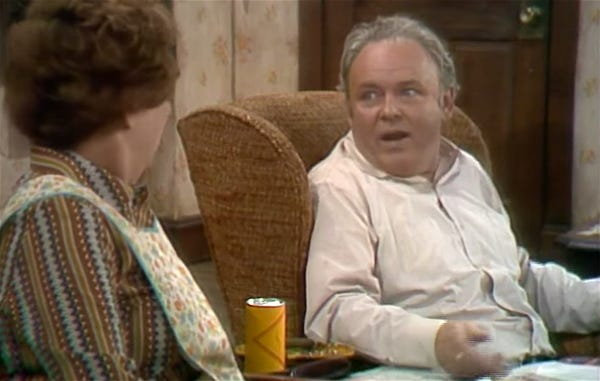
In All in the Family’s bold episode “Edith’s Problem,” the show explores menopause with unflinching honesty, emotional depth, and signature comedy. Discover why this 1972 classic changed how sitcoms handle real-life issues.
Breaking Television Taboos—One Hot Flash at a Time
When All in the Family aired “Edith’s Problem” in January 1972, American television had never seen anything like it. Instead of sticking to lighthearted gags, the show tackled one of the most taboo subjects on TV at the time: menopause.
Through the lens of Edith Bunker, the ever-kind, soft-spoken matriarch of the Bunker household, the episode brings attention to an issue that millions of women experience—but few shows dared to mention.
The Plot: Edith Isn’t Herself… and Archie Can’t Handle It
The story begins with Edith behaving in uncharacteristically irritable and emotional ways. Archie, as clueless and self-centered as ever, believes his wife has “gone crazy.” But when a doctor explains that Edith is going through “the change of life” (menopause), Archie is left bewildered and completely unprepared.
What follows is a masterful balance of comedy and compassion. Archie makes tone-deaf remarks, Mike and Gloria try to educate him, and Edith herself offers a beautifully vulnerable portrayal of a woman navigating physical and emotional change.
Why This Episode Was Groundbreaking
“Edith’s Problem” was a watershed moment for network television. At a time when even the word “menopause” was rarely uttered in public—let alone on a primetime sitcom—the episode brought it to the forefront with dignity, honesty, and a surprising amount of humor.
Jean Stapleton delivers an unforgettable performance, capturing Edith’s confusion, frustration, and quiet strength with grace. Meanwhile, Carroll O’Connor as Archie reacts in typical fashion—crude, ignorant, and deeply uncomfortable—but the comedy arises not from Edith’s experience, but from Archie’s refusal to grow.
Themes That Still Matter Today
This episode addressed themes that remain relevant over 50 years later:
-
Normalizing women’s health conversations
-
Challenging male ignorance and gender stereotypes
-
Highlighting the emotional complexity of aging
-
Using comedy to dismantle stigma
It taught viewers—especially male viewers—that menopause is a natural part of life, not something to be mocked, feared, or silenced.
Legacy and Cultural Impact
“Edith’s Problem” is often cited as one of All in the Family’s most important episodes. It opened the door for future TV shows to explore sensitive health topics with empathy and realism. It also cemented the series’ reputation as not just a sitcom, but a social mirror—one that reflected uncomfortable truths about American society, and then asked audiences to laugh, think, and evolve.
Final Thoughts
“Edith’s Problem” is more than just a funny episode—it’s a landmark moment in television history. With sharp writing, heartfelt performances, and fearless storytelling, it broke boundaries while keeping its humanity intact. Decades later, its message still resonates: dignity, understanding, and compassion are essential—especially when facing life’s most personal changes.